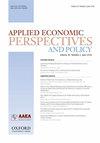国际贸易争端解决的未来
IF 3.4
2区 经济学
Q2 AGRICULTURAL ECONOMICS & POLICY
引用次数: 0
摘要
鉴于世界贸易组织上诉机构的持续功能失调,本文的重点是贸易争端解决的未来,并评估两个问题:(i)与通过现有优惠贸易协定(pta)进行的争端解决相比,WTO争端解决的现状如何?以及(ii)美国和欧盟在贸易政策/贸易争端解决方面的发展方法是什么?总的结论是,通过将“基于权力”的谈判应用于广泛的贸易政策问题,美国正在加剧贸易政策的不确定性。本文章由计算机程序翻译,如有差异,请以英文原文为准。
The future of dispute resolution in international trade
Given ongoing dysfunction of the World Trade Organization's Appellate Body, the focus of this article is on the future of trade dispute resolution, with evaluation of two questions: (i) What is the current status of WTO dispute resolution as compared to that conducted through existing preferential trade agreements (PTAs)? and (ii) What are the evolving approaches of the United States and EU to trade policy/trade dispute resolution? The overall conclusion is that, by applying “power-based” bargaining to a broad range of trade policy issues, the United States is contributing to increased trade policy uncertainty.
求助全文
通过发布文献求助,成功后即可免费获取论文全文。
去求助
来源期刊

Applied Economic Perspectives and Policy
AGRICULTURAL ECONOMICS & POLICY-
CiteScore
10.70
自引率
6.90%
发文量
117
审稿时长
>12 weeks
期刊介绍:
Applied Economic Perspectives and Policy provides a forum to address contemporary and emerging policy issues within an economic framework that informs the decision-making and policy-making community.
AEPP welcomes submissions related to the economics of public policy themes associated with agriculture; animal, plant, and human health; energy; environment; food and consumer behavior; international development; natural hazards; natural resources; population and migration; and regional and rural development.
 求助内容:
求助内容: 应助结果提醒方式:
应助结果提醒方式:


